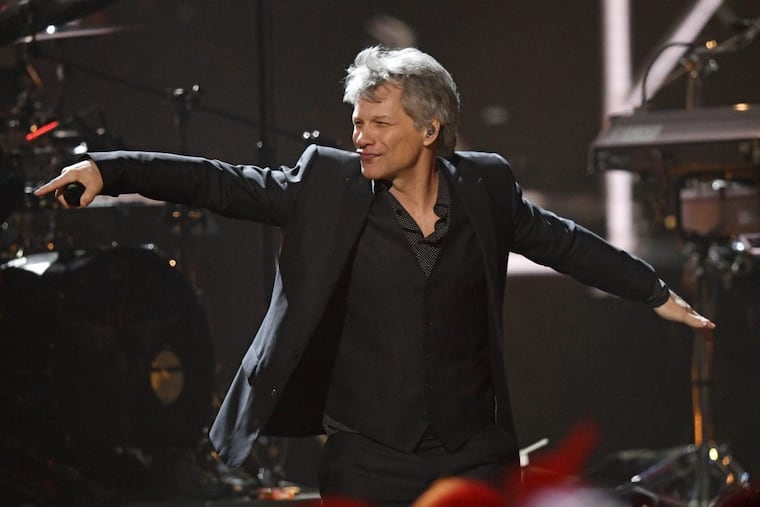Bon Jovi: 'There's a good portion of the planet that believes I'm from Philly'
"You never want to not be hungry."

On April 14, Jon Bon Jovi's namesake band was awarded its overdue Rock and Roll Hall of Fame induction, with Howard Stern singing their praises during the ceremony. The glam-metal band has sold more than 100 million records worldwide since 1983, and unlike most Rock Hall inductees, they're still selling: The band's most recent album, 2016's This House Is Not for Sale, hit No. 1 on the Billboard charts on two separate occasions. When he's not with the band, Bon Jovi dedicates his time to social concerns close to his heart — he works with the Jon Bon Jovi Soul Foundation and JBJ's Soul Kitchen in Red Bank, N.J., to fight hunger and homelessness.
"What could be left to prove?" he asks nonchalantly.
Yet, when Bon Jovi phones from his car to discuss his band's Thursday showcase at the Wells Fargo Center — a gig meant to celebrate WMMR's 50th anniversary — he makes it crystal clear that neither he nor his band ever lost the hunger they started with.
"You never want to not be hungry," he says.
For Bon Jovi, having a No. 1 album of blunt, provocative rock at a time when the music press claims rock is dead isn't so much a matter of vindication for him — "That sounds too angry," he says, "no vindication whatsoever." Rather, his goal is to "make an album that pleases us, and that marks a certain moment in our career. My hope is that every artist can say that. There is no 'I told you so.' There's none of that. We write songs that makes us proud. If I had to do otherwise — a co-branded song with a pop artist or a hip-hop artist — to get on the radio … that's not for me. That's not the message I want to project on the art I want to create."
Though many top-tier touring acts rest upon laurels and past victories, Bon Jovi says it's crucial for the band to create new music. "I do not want to tour on the catalog. For me, it's all about moving forward. Anytime I go into a new musical cycle, writing and recording new material is of absolute importance — making a statement and supporting it.
Bon Jovi prefers having a theme to write about; the album cover art of This House Is Not for Sale, with its deeply rooted tree gave him focus and made the new album invigorating. "Crafting a pop song is all well and good. I've done it. We've done it. But I'm at a different time of my life. We're all at a different point in our history, all of our lives. Subject matter matters. Having something to say is more important to me than a hit."
He says much of this new album has to do with the band finding themselves without guitarist and co-composer Richie Sambora, whose tenure in the band lasted from 1983 to 2013.
"There are several relationships to be considered on the record, which is, at its simplest, about love, life, loss, and everything in between," Bon Jovi says. "Some of this is about everything post-Richie and who we are and what we have to say. The subject matter of the title song alone — 'these four walls,' meaning that Richie is included — has a story to tell. The house may be falling apart [laughs], but it's not done. It's not over. Then you get a song such as 'The Devil's in the Temple' [and it] has to do with the momentary trouble that we had with our record company. 'New Year's Day' is about us reinventing our dynamic — that changed. There was a hole to fill, which we did and it was amazing to see [keyboardist] David [Bryan] and [drummer] Tico [Torres] stand up. We wanted to make an album at a time when the industry says repeatedly — repeatedly — that there's no need for a full album, just a song or two that you have to wait six months to climb up a chart. But you and I came up at a time when bands such as Led Zeppelin or the Police needed track seven to tell the full story. [Bruce Springsteen] could not have written The River and called 'Hungry Heart' an apt representation of that album. Nor was 'When Doves Cry' an apt representation of Purple Rain. So, we recommitted to the values that I started with 35 years ago. "
Thinking back to those beginnings, Bon Jovi laughs while saying that new bands are no longer restricted by the radio or record store formats of yore ("The opportunity for anything from anywhere to be played is there"), while enthusing about the relationship between himself and the radio station that aided in making "Runaway" a hit.
"WMMR is a throwback to when radio truly mattered," says Bon Jovi. "For example, Pierre Robert still wants to engage and educate his audience, and share in the moment of new music, whether it's a band from South Philly or a singer-songwriter from South Jersey. I can't say enough about how supportive he and that station have been to us. You have to figure, there's a good portion of the planet that believes I'm from Philly, probably because of all the Philly relationships that I was blessed — am still blessed — to have in my life. The Philly Soul Foundation is still located on Market Street — I was in town for a meeting not long ago — and though it is not official, our intention is to open our next Soul Kitchen in your town. Be it the band, the football team, or the foundation, we're still very Philly."
MUSIC
Bon Jovi
7:30 p.m. Thursday, Wells Fargo Center, 3601 S. Broad St., $19.75-545, wellsfargocenterphilly.com